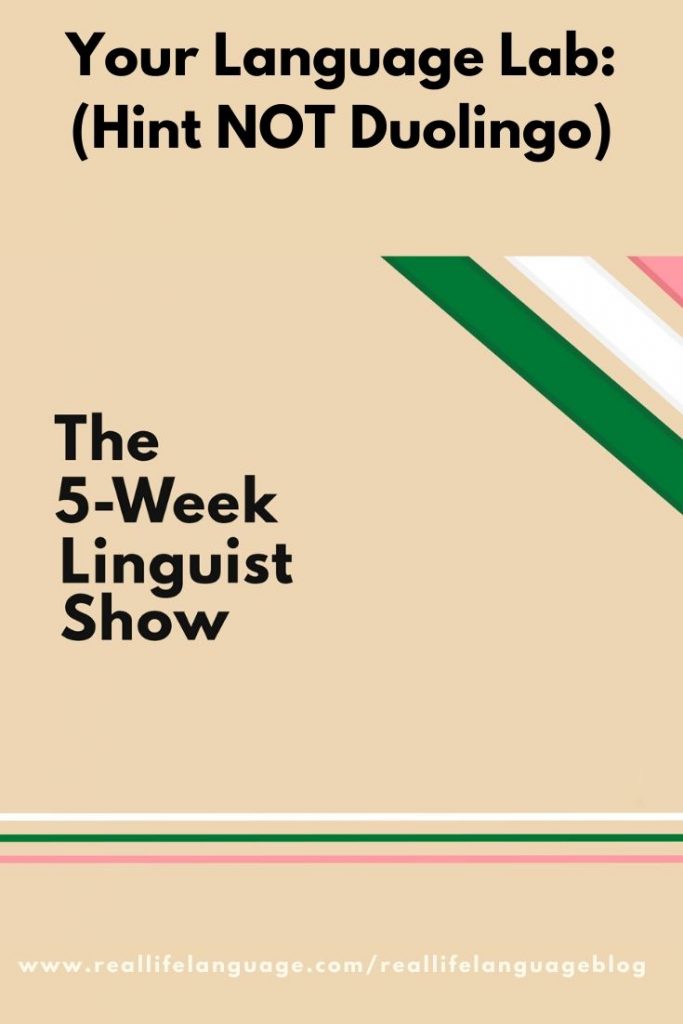
Language Learning Apps that AREN’T Duolingo: Create the Ultimate Language Learning Lab
Anyone who loves languages knows (and loves) Duolingo and Google Translate- they are great language learning apps. While they are both super useful and definitely popular (Duolingo has more than 100 million users alone), you’ll need further practice to bring your language skills to real fluency.
Language labs are an essential component to building skills in any language. In the lab, we experiment, take risks and build skills. Your language lab might be time spent abroad, immersed in the target language. Your language lab might look a lot like the more traditional academic language labs with headphones, devices and exercises.
The internet has completely transformed our ability to connect with language and culture all over the world. Smartphones have now made it possible to have all of this anywhere, and right in the palm of your hand. Check out these 7 surprising language learning apps that transform your phone into the ultimate language lab that aren’t Duolingo:
While practicing your productive skills (speaking and writing) is a critical part of developing fluency, we first learn through what we understand. Audible has great courses for beginners in numerous languages. Once you are looking to get to that advanced, or even near native-level, get a subscription and immerse yourself in novels and self-help books in your target language. Listen and learn vocabulary, advanced grammar and structures (all in context) while you walk, do errands or accomplish other goals in your life.
The iBooks store offers users the option of purchasing ebooks, in addition to purchasing audiobooks. The iBooks phone app-or your phone’s OS equivalent or personal preference-allows easy access to ebooks and PDFs in the target language. Again, what we read and what we hear is where we first learn new language. Get free material for iBooks from places like Project Gutenberg.
Time spent engaged in language is one of the biggest factors in attaining and building fluency. We already know that we can soak up as much language as we want, wherever we want with audio books and ereaders. Speaking and writing give us that all-important test. Can you say what you want to say? If not, go back and work on it. Set the timer and practice your new language with friends, groups, teachers or even yourself. Absolute beginner? Start timing yourself reading dialogues and vocabulary or studying. Increase your time periods regularly. Your skills will start to grow exponentially.
Document the rapid progress towards fluency you are making by timing your sessions practicing speech by recording them with the unconventional language learning app-Voice Memos (or your OS equivalent). Start with short sessions (even two or three minutes each day), and increase regularly. Each month, listen to a recording from the month prior and be astonished at how far you have come.
Talk to native speakers from all over the world and meet your goals in record time on Italki. You connect with them and schedule lessons on the site, and then meet up with them on FaceTime or similar apps, like Google Hangouts or Skype.
Journaling is one of the most powerful ways to build skills in a language. Similar to the sessions in which you practice speaking to yourself, journals allow you to practice building your skills by “talking” on paper. Think words and phrases for absolute beginners. You can even draw and label vocabulary. When you are at a level where you still need an aid to write most words, you can start with very simple writing tasks. Draw a house and label all of the rooms and contents. Do the same by drawing a meal, or even make your own comic strip. Move to writing paragraphs about yourself, your family, your future dreams, or even politics when you hit the the intermediate and advanced levels. Pick a topic, set the timer, and write. Use your notes to fill in the gaps of what you didn’t know when the timer goes off. You can even share your work with a native speaker (like one on italki) to make corrections and provide you with feedback. Journal regularly, increase the time each week and watch your fluency hit levels you never thought possible.
Bestselling author Gabriel Wyner shared his method of creating immersive and personalized Anki card sets to learn new languages in his very popular and well-written book, Fluent Forever. Gabriel is taking it a step further with an app that actually makes the entire process so easy by offering this same system within an app. Your learning can be completely customized and delivered to you using the same type of spaced repetition as Anki. There are even native speakers available to answer your questions. The best part? Gabe is offering some great perks as he builds and develops the app. Check them out here and be the first to have your own, completely personalized set of materials.
These seven language learning apps allow you to learn vocabulary, grammar, pronunciation and syntax and can offer great learning experiences for learners at all levels even though they aren’t Duolingo (but we still love it). They also allow you to build fluency by practicing on your own or connecting with native speakers, without ever leaving your own country, transforming your phone into the ultimate language learning lab.
https://reallifelanguage.lpages.co/4-tools-to-measure-your-progress-in-any-language/
Fun http://reallifelanguage.com/reallifelanguageblog/2019/09/30/language-teaching/
Podcast: Play in new window | Download
Subscribe: RSS